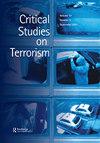The cultural construction of sympathiser social identities in the Islamic state’s virtual ecosystem: an analysis of the politics of naming
IF 2.5
Q2 POLITICAL SCIENCE
引用次数: 0
Abstract
ABSTRACT This study explores the politics of naming in the Islamic state (IS) media networks, looking into how sympathisers’ (munāsir-s) virtual identities are socially constructed online. Naming is a discursive practice which is purely ideological in that when sympathisers name themselves online, they re-imagine their roles and the boundaries of their national belonging alongside cultural representations of the organisation. By naming, they reify IS cultural heritage which is recontextualised from the historical legacy of the Prophet and Islamic Conquest. By naming, they also amplify IS hegemonic cultural frames and master narratives. In this sense, naming oneself in the IS virtual ecosystem is a significant rhetorical strategy that may fulfil at least one of the three main cultural functions. Names may (1) imitate historical role models, (2) reconstruct the sense of belonging to homophilic communities (brothers of the same faith) beyond ethno-racial geographies, and/or (3) convey a politically religionist bias in constructing the self vs. the other. The politics of naming is an online social learning process in which collective intelligence instructs sympathisers on how to create accounts with innovative iconic/connotative identifying aliases. In IS social ecology, naming may stand for a ritual call to adventure, the destination of which is already recognised. Sympathisers are interpellated as jihadi subjects to cross the threshold of their ordinary world and embark on a virtual journey to media jihad – hence, their recognition of their new subject positions in support groups and the potential manufacturing of their loyalty and disavowal (al-walā’ wa l-barā’).伊斯兰国家虚拟生态系统中同情者社会身份的文化建构:命名政治分析
本研究探讨了伊斯兰国(IS)媒体网络中的命名政治,研究了同情者(munāsir-s)的虚拟身份是如何在网上社会建构的。命名是一种纯粹意识形态的话语实践,当同情者在网上为自己命名时,他们会重新想象自己的角色和国家归属的边界,以及组织的文化表征。通过命名,他们从先知和伊斯兰征服的历史遗产中重新定位了IS的文化遗产。通过命名,他们也放大了IS的霸权文化框架和主导叙事。从这个意义上说,在IS虚拟生态系统中命名自己是一种重要的修辞策略,可以至少实现三个主要文化功能中的一个。名字可能(1)模仿历史上的角色典范,(2)重建超越民族-种族地理的同性恋社区(相同信仰的兄弟)的归属感,和/或(3)在构建自我与他者时传达一种政治上的宗教偏见。命名政治是一个在线社会学习过程,在这个过程中,集体智慧指导同情者如何使用创新的标志性/内涵识别别名创建账户。在他的社会生态中,命名可能代表着一种冒险的仪式召唤,其目的地已经被确认。同情者被要求作为圣战的主体,跨越他们平常世界的门槛,踏上通往媒体圣战的虚拟之旅——因此,他们承认自己在支持团体中的新主体地位,并潜在地制造他们的忠诚和否认(al- wali ' wal - bari ')。
本文章由计算机程序翻译,如有差异,请以英文原文为准。
求助全文
约1分钟内获得全文
求助全文

 求助内容:
求助内容: 应助结果提醒方式:
应助结果提醒方式:


